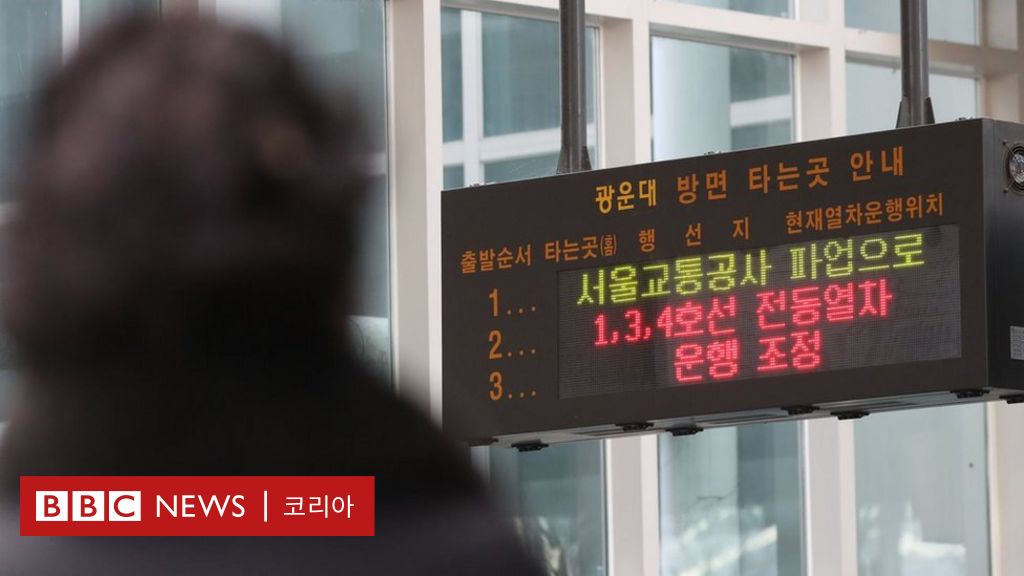photo source, News1
Due to the Seoul subway strike, the subway operation rate is expected to drop to 70-80% when excluding commuting hours.
On the 30th, the union of the Seoul Transportation Corporation, which manages lines 1-8 of the Seoul subway and some sections of line 9 (Sinnonhyeon-Central Veterans Hospital), called a general strike.
The day before, the trade union negotiating group composed of the union of Seoul Transportation Corporation (the Korean Confederation of Trade Unions) and the integrated union of Seoul Transportation Corporation (the Korean Federation of Trade Unions) and the management started negotiations, but in the end they are interrupted.
Will it affect my commute?
Seoul Transportation Corporation announced that it would take steps to ensure subway operation is not affected during rush hours (7am to 9am) by introducing replacement personnel.
Metro service continues as usual from 5:30am to 1:00am the following day.
However, the Metro’s operating rate will decrease to 70-80% of normal at other times, including peak hours.
The normal hourly operation rate per route announced by the company is ▲Line 1 94.9% ▲Line 2 Main Line 74.3% Seongsuji Line 76.6% Sinjeongji Line 75.9% ▲Line 3 60.3% ▲Line 4 60.3% ▲Line 5 80.6% ▲Line 6 79.8% ▲Line 7 80.2% ▲Line 8 79.8% level.
Why do we talk about strikes every year?
The main problem of the Seoul subway strike is the reduction of personnel due to the chronic deficit.
Last year, Seoul Transportation Corporation reported a net loss (loss) of about 964.4 billion won. In 2020, it was 1.1137 trillion won, 586.5 billion won in 2019, and 538.9 billion won in 2018.
According to the National Bureau of Statistics, as of last year, the per-passenger fare loss of the Seoul Metro was 1,005 won. This means that every time a passenger uses the subway, 1,005 won is lost.
The company has established a plan to lay off about 1,500 people, or 10% of its workforce, by 2026 to address its financial deterioration.
It is the first time in six years since September 2016 that the Seoul Transportation Corporation union has gone on strike.
Last year the union protested the restructuring and announced a strike, but last-minute negotiations were successful. At the time, workers and management were reported to have agreed that there would be no forced restructuring due to the financial crisis.
In addition, the union called for the system of peak pay and staffing to be improved in 2019 and the driving hours of flight attendants to be reduced in 2020, but the negotiations were successful and did not lead to a strike.
photo source, News1
Last September, many mourners visited the scene of the stalking and murder at Sindang Station.
“Reducing the workforce by asking for safety is a nonsense”
The union points out that it is contradictory to call for a reduction in staff at a time when the safety of executives and passengers has become even more important due to a series of recent accidents.
The union said, “Since the October 29 disaster, the city of Seoul has hired workers from its headquarters to guide passengers as a safety measure for congested stations.”
Last September, a station employee of Seoul Transportation Corporation was killed by a former colleague who was stalking her as she single-handedly checked the toilets of Sindang Station in Seoul Metro.
The union argues that the government should compensate for the loss of fares caused by free riding. Under the Elderly Welfare Act, seniors aged 65 and over can use the subway for free.
Last year, the number of people who used Seoul’s subway lines 1 to 8 for free was 205.74 million, and when converted into fares, the loss amount exceeds 250 billion won.
Some say tube fares, which have been frozen for six years, should be raised. Seoul Metro’s general fare has been frozen for six years and is 1,250 won for transit cards and 1,350 won for cash.
KORAIL also announces a strike… Concerns about “traffic problems” are growing.
If the Seoul Transportation Corporation union strike is extended and Korea Railroad (Korail) joins the strike on the 2nd of next month, “traffic chaos” may occur.
Korail operates Line 1, Line 3 (Ilsan Line) and Line 4 (Ansan-Gwacheon Line) together with the Seoul Metro.
If strikes occur simultaneously between the union of Seoul Transportation Corporation and the union of Korea Railroad, the normal operating rate is expected to drop to ▲ 55.2% for Line 1, 60.3% for Line 3 and 60.3 % for Line 4.

